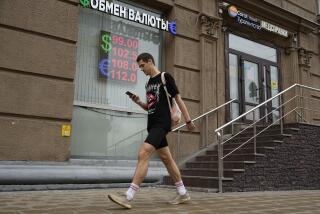CURRENCY : Dollar Jumps, Gold Sinks in Reaction to Gorbachev Plan
- Share via
NEW YORK — The dollar surged and gold prices skidded Wednesday after Soviet President Mikhail S. Gorbachev announced that his nation would reduce the size of its military.
The dollar rose more than 2 pfennigs against the West German mark, while gold dropped more than $4 an ounce.
Gorbachev told the United Nations that the Soviet Union would cut its troop strength by half a million and reduce the number of its conventional armaments.
The dollar, which had moved higher before Gorbachev’s speech, soared on foreign and domestic markets after his announcement.
James McGroarty, a vice president at Discount Corp. in New York, said the markets decided that the Soviet move would result in a cut in U.S. defense spending and therefore help reduce the budget deficit.
But the dollar gave up some ground after traders began to analyze Gorbachev’s statement to see how significant it really was, McGroarty said.
He described the dollar’s initial surge as a “knee-jerk reaction” to the speech.
Overseas dealers said the dollar also fell because it had shot up too quickly.
“People were just reacting blindly,” one dealer said. “If anything, it’s usually an escalation of hostilities that encourages people to buy dollars, not a de-escalation, unless that would benefit the U.S. economy.”
Nonetheless, the dollar managed a strong advance for the day.
In London, the dollar spurted against the British pound. It cost $1.8425 to buy one pound, cheaper than $1.8675 late Tuesday. In later New York trading, the pound slipped to $1.8435 from late Tuesday’s $1.86025.
Other late dollar rates in New York, compared to late Tuesday’s prices, included: 1.75975 West German marks, up from 1.7376; 1.4795 Swiss francs, up from 1.45755; 6.0035 French francs, up from 5.9130; 1,299.00 Italian lire, up from 1,282.50, and 1.19925 Canadian dollars, up from 1.19135.
Other late dollar rates in Europe, compared to late Tuesday’s rates, included: 1.7588 West German marks, up from 1.7290; 1.4790 Swiss francs, up from 1.4480; 6.0025 French francs, up from 5.9015; 1.9675 Dutch guilders, up from 1.9470; 1,290.75 Italian lire, up from 1,277.12, 1.1995 Canadian dollars, up from 1.1887.
In Tokyo, where trading ended hours before Gorbachev’s speech, the dollar rose 0.89 Japanese yen to a closing 122.43 yen. Later, in London, it rose further to 123.25 yen, and in New York, it rose to 123.525 yen from late Tuesday’s 121.915..
Meanwhile, gold prices fell as traders saw signs of peace in Gorbachev’s statement.
“In times of uncertainty, gold tends to firm,” said Stephen Platt, a metals analyst with Dean Witter Reynolds Inc. in Chicago.
Gorbachev’s announcement removed the “fear factor” from the market, Platt said.
Republic National Bank of New York quoted a late bid of $422.50 an ounce, down from $426.75 late Tuesday. On the Commodity Exchange in New York, gold dropped to $422.80 from $427.50.
Gold fell in London to a late bid of $422.95, compared to $427.25.
In Zurich, Switzerland, gold finished at $423.50, compared to $427.75.
Earlier, in Hong Kong, gold fell $3.07 to close at $426.66.
Silver bullion prices rose on the London market where the metal was trading at a late bid price of $6.14 an ounce, compared to $6.12 bid late Tuesday. But silver skidded on the Commodity Exchange, falling to $6.140 from $6.161.
Tables, Page 10
More to Read
Sign up for Essential California
The most important California stories and recommendations in your inbox every morning.
You may occasionally receive promotional content from the Los Angeles Times.













